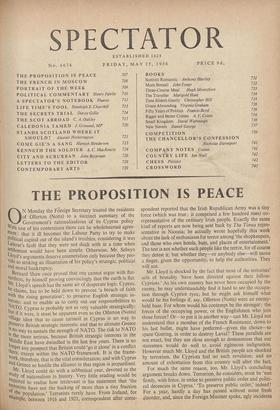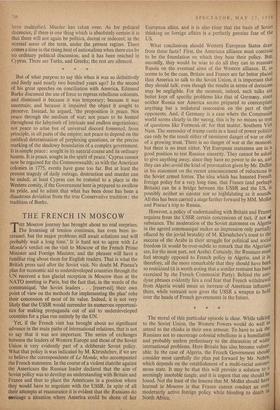THE PROPOSITION IS PEACE
ON Monday the FOreign Secretary treated the residents of 011erton (Notts) to a succinct summary of the Government's rationalisations of its Cyprus policy 'ith one of his contentions there can be wholehearted agree- raeut ; that it ill becomes the Labour Party to try to make Political capital out of the island's troubles, considering it was Labour's fault that they were not dealt with at a time when settlement would have been simple. Otherwise, Mr. Selwyn LloYd's arguments deserve enumeration only because they pro- vid "e so striking an illustration of his policy's strategic, political and moral bankruptcy. Bernard Shaw once proved that one cannot argue with flat- earthers, by himself proving convincingly that the earth is flat. Mr. Lloyd's speech has the same air of desperate logic. Cyprus, he claims, has to be held down to prevent 'a breach of faith teith the rising generation'; to preserve English strategic in- %II Nr,ests; and to enable us to carry out our responsibilities to bli60:0. Cyprus is probably not so very valuable strategically; t if it were, it must be apparent even to the 011erton (Notts) yip 'age idiot that to cause turmoil in Cyprus is no way to Preserve British strategic interests; and that to alienate Greece is is no way to sustain the strength of NATO. The risk to NATO m.the more serious, because British strategic interests in the lo iddle East have dwindled in the last five years. There is no thliger any prospect that Britain could `go it alone' in a conflict ere, except within the NATO 'framework. It is the frame- Work, therefore, that is the vital consideration; and with Cyprus and Greece so hostile the alliance in that region is jeopardised. Mr. Lloyd could do with a sabbatical year, devoted to the Stl tuY. of nationalism in history. Very little reading would be reac.luired to realise how irrelevant is his statement that 'the fterrorists have not the backing of more than a tiny fraction o ru ..ne population.' Terrorists rarely have. From Ireland, for example, between 1916 and 1921, correspondent after corre- spondent reported that the Irish Republican Army was a tiny force (which was true : it comprised a few hundred men) un- representative of the ordinary Irish people. Exactly the same kind of reports are now being sent back by The Times repre- sentative in Nicosia; he actually wrote hopefully this week about the lack of enthusiasm for terror among 'the shopkeepers, and those who own hotels, bars, and places of entertainment.' The test is not whether such people like the terror, for of course they detest it; but whether they—or anybody else—will move a finger, given the opportunity, to help the authorities. They will not.
Mr. Lloyd is shocked by the fact that most of the terrorists' acts of brutality 'have been directed against their fellow- Cypriots.' As his own country has never been occupied by the enemy, he may understandably find it hard to see the occupa- tion through Cypriot eyes; but he might ask himself what would be his feelings if, say, 011erton (Notts) were an enemy- held base. For whom would his contempt be the stronger : the forces of the occupying power, or the Englishmen who join those forces? Or—to put it in another way—can Mr. Lloyd not understand that a member of the French Resistance, down to his last bullet, might have preferred—given the choice—to spare Goering, in order to destroy Laval? These parallels are not exact, but they are close enough to demonstrate that our statesmen would do well to avoid righteous indignation. However much Mr. Lloyd and the British people are shocked by terrorism, the Cypriots feel no such revulsion; and no amount of exhortation from this country will alter the fact.
For much the same reason, too, Mr. Lloyd's concluding argument breaks down. Terrorism, he considers, must be 'met firmly, with force, in order to preserve public order and politi- cal decencies in Cyprus.' To preserve public order,' indeed! For a year, hardly a day has passed without some fresh disorder, and, since the Foreign Minister spoke, ugly incidents have multiplied. Murder has taken over. As for political decencies, if there is one thing which is absolutely certain it is that there will not again be politics, decent or indecent, in the normal sense of the term, under the present regime. There comes a time in the rising heat of nationalism when there can be no ordinary political discussion; and it has been reached in Cyprus. There are Turks, and Greeks; the rest are silenced.
* * * But of what purpose to say this when it was so definitively and finely said nearly two hundred years ago? In the second of his great speeches on conciliation with America, Edmund Burke discussed the use of force to repress rebellious colonists, and dismissed it because it was temporary; because it was uncertain; and because it impaired the object it sought to preserve. Instead, he argued, 'the proposition is peace. Not peace through the medium of war; not peace to be hunted throughout the labyrinth of intricate and endless negotiations; not peace to arise but of universal discord fomented, from principle, in all parts of the empire; not peace to depend on the juridical determination of perplexing questions, or the precise marking of the shadowy boundaries of a complex government. It is simple peace : sought in its natural course and its ordinary haunts. It is peace, sought in the spirit of peace.' Cyprus cannot now be regained for the Commonwealth; as with the American colonies in 1775, events have gone too far. But at least the present tragedy of daily outrage, destruction and murder can be ended; at least Cyprus can be restored to a place in the Western comity, if the Government here is prepared to swallow its pride, and to admit that what has been done has been a disastrous deviation from the true Conservative tradition : the tradition of Burke.











































 Previous page
Previous page